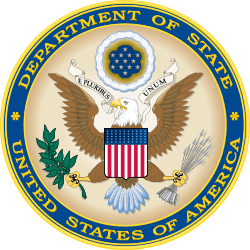Samuel W. Lewis
| Samuel Winfield Lewis | |
|---|---|
 | |
| Born |
October 1, 1930 Houston, Texas |
| Died | March 10, 2014 (aged 83) |
| Alma mater |
Johns Hopkins University Yale University |
Samuel Winfield Lewis (October 1, 1930 – March 10, 2014) was an American diplomat. During his lengthy career with the United States Department of State he served as Assistant Secretary of State for International Organization Affairs (1975–1977), U.S. ambassador to Israel (1977–1985) and Director of Policy Planning (1993–1994).[1][2] As ambassador to Israel, Lewis played a major part in bringing about the 1978 Camp David Accords between Israel and Egypt. Lewis also headed the United States Institute of Peace from 1987 through 1993.[3]
Early life and career
Born in Houston, Texas, Lewis received an A.B. from Yale University in 1952 and an M.A. from Johns Hopkins University School of Advanced International Studies (SAIS) in 1954.
Lewis joined the Foreign Service in 1954 and served as consular officer at Naples. From 1955 to 1959, he was a political officer and acting principal officer in Florence. From 1959 to 1961, he was officer in charge of Italian Affairs in the State Department. From 1961 to 1962, Lewis served as Special Assistant to the Under Secretary of State.
In 1963–64 he was a visiting fellow at Princeton University. He served as Deputy Assistant Director for Technical Cooperation for AID in Rio de Janeiro, on detail, and in 1966 he was executive assistant to the Ambassador in Rio de Janeiro. In 1966 Lewis received the Meritorious Honor Award from the State Department and the Meritorious Honor Award the same year from AID.[4]
In 1967 and 1968, Lewis was Assistant Director for Development in the Office of Brazilian Affairs at AID, and in 1968 he became Deputy Director of that Office In 1968 and 1969, he was a senior staff member on the National Security Council at the White House (on detail).
In 1969 Lewis was Special Assistant for Policy Planning in the Bureau of Inter-American Affairs at the State Department, and in 1970 and 1971 he was special assistant to the Director General of the Foreign Service.
From 1971 to 1974 Lewis was Deputy Chief of Mission, Kabul. He was Deputy Director of the Policy Planning staff from 1974 until 1975, when he became Assistant Secretary of State for International Organization Affairs.
Israel and Camp David Accords
In 1977–85 Lewis served as Ambassador to Israel under Presidents Carter and Reagan, the second longest tenure of any US Ambassador to Israel.[5] As ambassador, Lewis had a major role in negotiating the Camp David peace talks in 1978 that resulted in a historic treaty between Egypt and Israel.
“Sam set a frame of reference that allowed Carter to understand Begin,” Aaron David Miller, a vice president of the Wilson Center and a former U.S. Middle East negotiator, told The Washington Post.[6] “He managed to gain Begin’s confidence and that set the stage for what I think is the most important act of diplomacy by an American president ever in the Middle East.”
The Camp David Accords were signed September 17, 1978, and within months Begin and Sadat were jointly awarded the Nobel Peace Prize. A formal treaty between Egypt and Israel was announced the next year, calling for Israel to withdraw its forces from the Sinai Peninsula and placing limits on Egypt’s military presence in the region.
“Nothing was more important than this heroic act of diplomacy,” Miller said. “There was a time when American ambassadors had the will, skill and power to make a difference in diplomacy. Sam was, bar none, one of the best.”
Later life
Lewis was a frequent guest commentator on Middle Eastern issues for television and radio programs. In 2009 he was featured in a documentary directed by Harry Hunkele called Back Door Channels: The Price of Peace.[7] Back Door Channels takes its name from the important yet seldom understood role that unofficial back channels of communications, often through third-party countries and private businessmen, played in securing the peace between Israel and Egypt. In addition, the film’s producers conducted in-depth interviews with many of the original participants from the first historic peace process, including former U.S. President Jimmy Carter and other world leaders.
In 2011 the United States Institute of Peace dedicated the Samuel W. Lewis Hall.[8]
Lewis sat on the U.S. Advisory Council of the Israel Policy Forum, and was involved in the J Street project. He was also an active board member of the American Academy of Diplomacy.
Lewis died of lung cancer on March 10, 2014 at the age of 83.[6]
References
- ↑ "Samuel W. Lewis" (PDF). Table of Contents. Association for Diplomatic Studies and Training. Retrieved September 27, 2012.
- ↑ "Samuel Winfield Lewis (1930-)". Home > Department History > People. Office of the Historian, Bureau of Public Affairs, United States Department of State. Retrieved September 27, 2012.
- ↑ Silman-Cheong, Helen, Wellesley Aron, Rebel with a Cause, Valentine Mitchell, 1992, Foreword
- ↑ "United States Ambassador to Israel - Nomination of Samuel W. Lewis". The American Presidency Project. Retrieved 8 March 2015.
- ↑ "CHIEFS OF MISSION FOR ISRAEL". U.S. Department of State: Office of the Historian. Retrieved 8 March 2015.
- 1 2 Schudel, Matt (12 March 2014). "Samuel W. Lewis, former U.S. ambassador to Israel, dies at 83". The Washington Post. Retrieved 8 March 2015.
- ↑ "Back Door Channels". Retrieved 8 March 2015.
- ↑ "Peace Institute Dedicates Hall to Ex-Ambassador". The Jewish Daily Forward. Retrieved 8 March 2015.
External links
| Government offices | ||
|---|---|---|
| Preceded by William B. Buffum |
Assistant Secretary of State for International Organization Affairs December 22, 1975 – April 13, 1977 |
Succeeded by Charles W. Maynes |
| Diplomatic posts | ||
| Preceded by Malcolm Toon |
U.S. Ambassador to Israel 1977 – 1985 |
Succeeded by Thomas R. Pickering |
